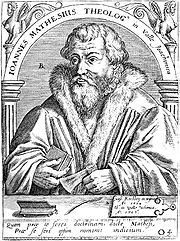
Johannes Mathesius
Encyclopedia

Martin Luther
Martin Luther was a German priest, professor of theology and iconic figure of the Protestant Reformation. He strongly disputed the claim that freedom from God's punishment for sin could be purchased with money. He confronted indulgence salesman Johann Tetzel with his Ninety-Five Theses in 1517...
's Table Talk
Table Talk (Luther)
Martin Luther's Table Talk is a collection of his sayings. It was compiled by Johannes Mathesius and published at Eisleben in 1566.Mathesius spoke enthusiastically of the privilege of eating with Luther and hearing him converse...
, or notes taken of Luther's conversation and published afterwards. He rivaled Anton Lauterbach in his diligence in notetaking, and surpassed him in the discrimination with which he arranged it.
Biography
His father was a Councilor of RochlitzRochlitz
Rochlitz is a major district town in the district of Mittelsachsen, in the Free State of Saxony, Germany. Rochlitz is the head of the “borough partnership Rochlitz” with its other members being the boroughs of Königsfeld, Seelitz und Zettlitz...
, where he was born in 1504. During 1523–1525 he studied at Ingolstadt
University of Ingolstadt
The University of Ingolstadt was founded in 1472 by Louis the Rich, the Duke of Bavaria at the time, and its first Chancellor was the Bishop of Eichstätt. It consisted of five faculties: humanities, sciences, theology, law and medicine, all of which were contained in the Hoheschule...
, from whence he drifted into Bavaria
Bavaria
Bavaria, formally the Free State of Bavaria is a state of Germany, located in the southeast of Germany. With an area of , it is the largest state by area, forming almost 20% of the total land area of Germany...
, where he became converted to the Protestant cause. The renown of Luther and Melanchthon drew him to Wittenberg
Wittenberg
Wittenberg, officially Lutherstadt Wittenberg, is a city in Germany in the Bundesland Saxony-Anhalt, on the river Elbe. It has a population of about 50,000....
in 1529, but he did not, at this time, come into close relations with his teachers. In 1530 he was called as Baccalaureus to the school at Altenberg
Altenberg, Germany
Altenberg is a town in the Sächsische Schweiz-Osterzgebirge district, in the Free State of Saxony, Germany. It is situated in the Ore Mountains, close to the border with the Czech Republic, 15 km northwest of Teplice, and 32 km south of Dresden....
, and in 1532 was promoted to the headmastership of the Latin school at Joachimsthal, a mining town which had recently sprung up. In 1540 a lucky speculation in mines let him realize his ambition of a clerical calling, and he became a theological student at Wittenberg
Wittenberg
Wittenberg, officially Lutherstadt Wittenberg, is a city in Germany in the Bundesland Saxony-Anhalt, on the river Elbe. It has a population of about 50,000....
. The recommendations of Justus Jonas
Justus Jonas
Justus Jonas was a German Lutheran reformer.-Biography:Jonas was born at Nordhausen in Thuringia. His real name was Jodokus Koch, which he changed according to the common custom of German scholars in the sixteenth century, when at the University of Erfurt...
and Georg Rörer
Georg Rörer
Georg Rörer was a Lutheran reformer and pastor from Bavaria. He was one of the first clergymen ordained by Martin Luther himself in 1525. His office was deacon. He assisted in Luther's work of translating the Bible and served as Luther's secretary beginning in 1537...
got him the prized honor of a seat at Luther's table.
It is not known exactly how long Mathesius was Luther's guest, but it was probably no longer than the period of May to November 1540 covered by his notes of the Table Talk. He left Luther's house because he had collected pupils to tutor; at first Luther boarded as many as four of Mathesius's pupils, but Luther had to draw the line somewhere, so eventually Mathesius had to leave and take his pupils with him. Mathesius took the degree of master in September 1540, spent nineteen months more in study, and then returned to Joachimsthal as deacon. He revisited Luther in the spring of 1545 and later became pastor of the church at Joachimsthal until his death. During his later life he made a collection of Table Talk taken down by others, and added them to his own.
Luther's Table Talk
Mathesius spoke enthusiastically of the privilege of eating with Luther and hearing him converse. He stated that Luther's disciples would not speak until spoken to, and that then it was usually Schiefer who answered for the company. Earlier notetakers had written down only the serious remarks of Luther, but Mathesius also wrote down the facetious or even damaging remarks, a sign of the increasing reverence in which Luther was held. He was the first to publish an edition of Luther's Table TalkTable Talk (Luther)
Martin Luther's Table Talk is a collection of his sayings. It was compiled by Johannes Mathesius and published at Eisleben in 1566.Mathesius spoke enthusiastically of the privilege of eating with Luther and hearing him converse...
.
Mineralogy
Mathesius was also a mineralogist and a colleague of Georg AgricolaGeorg Agricola
Georgius Agricola was a German scholar and scientist. Known as "the father of mineralogy", he was born at Glauchau in Saxony. His real name was Georg Pawer; Agricola is the Latinised version of his name, Pawer meaning "farmer"...
"the father of mineralogy
Mineralogy
Mineralogy is the study of chemistry, crystal structure, and physical properties of minerals. Specific studies within mineralogy include the processes of mineral origin and formation, classification of minerals, their geographical distribution, as well as their utilization.-History:Early writing...
" who also lived in Joachimsthal. He was the first to describe any form of tourmaline
Tourmaline
Tourmaline is a crystal boron silicate mineral compounded with elements such as aluminium, iron, magnesium, sodium, lithium, or potassium. Tourmaline is classified as a semi-precious stone and the gem comes in a wide variety of colors...
in detail.

